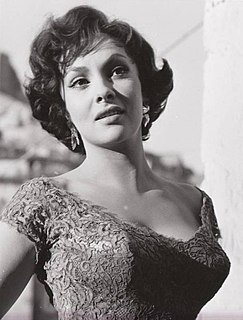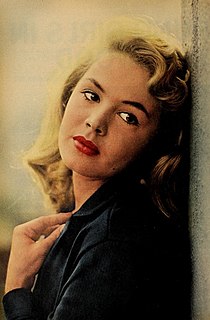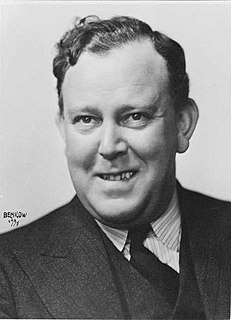
Sir Peter Alexander Ustinov was a British actor, filmmaker and writer. As an internationally known raconteur, he was a fixture on television talk shows and lecture circuits for much of his career. An intellectual and diplomat, he held various academic posts and served as a goodwill ambassador for UNICEF and president of the World Federalist Movement.

Olivia Hussey is an English film, stage, and television actress. Her accolades include a Golden Globe Award and a David di Donatello Award. The daughter of Argentine opera singer Andrés Osuna, Hussey was born in Buenos Aires but spent most of her early life in her mother's native England. She aspired to become an actress at a young age and studied drama for five years at London's Italia Conti Academy of Theatre Arts.

Luigia "Gina" Lollobrigida is an Italian actress, photojournalist, and politician. She was one of the highest-profile European actresses of the 1950s and early 1960s, a period in which she was an international sex symbol. As of 2022, Lollobrigida is among the last living, high-profile international actors from the Golden Age of Hollywood cinema.

Sandra Dee was an American actress. Dee began her career as a child model, working first in commercials, and then film in her teenage years. Best known for her portrayal of ingénues, Dee earned a Golden Globe Award as one of the year's most promising newcomers for her performance in Robert Wise's Until They Sail (1958). She became a teenage star for her performances in Imitation of Life and Gidget, which made her a household name.

John A. Gavin was an American actor who was the president of the Screen Actors Guild (1971–73), and the United States Ambassador to Mexico (1981–86). He was best known for his performances in the films Imitation of Life (1959), Spartacus (1960), Psycho (1960), and Thoroughly Modern Millie (1967), playing leading roles in a series of films for producer Ross Hunter.
The Tammy movies are a series of four light-hearted American films about a naive young lady from Mississippi. They were produced by Universal between 1957 and 1967, and based on the character created in Cid Ricketts Sumner's 1948 book Tammy out of Time.

Suzanne Cloutier was a Canadian film actress.

William Shakespeare's Romeo and Juliet may be one of the most-screened plays of all time. The most notable theatrical releases were George Cukor's multi-Oscar-nominated 1936 production Romeo and Juliet, Franco Zeffirelli's 1968 film Romeo and Juliet, and Baz Luhrmann's 1996 MTV-inspired Romeo + Juliet. The latter two were both, at the time, the highest-grossing Shakespeare films. Cukor featured the mature actors Norma Shearer and Leslie Howard as the teenage lovers while Zeffirelli populated his film with beautiful young people, and Baz Luhrmann produced a heavily cut fast-paced version aimed at teenage audiences.
Romanoff and Juliet is a play by Peter Ustinov. A comic spoof of the Cold War, it is set in the small mythical mid-European country of Concordia, whose leader is wooed by the United States and the Soviet Union, each one wanting him as an ally. Russia's ambassador, a member of the Romanoff family, has a son Igor who falls in love with Juliet, the daughter of the US diplomat. The two opposing families, one communist, the other capitalist, represent the warring Capulets and Montagues of Romeo and Juliet.

William John Phillips MC was an English actor. He is known for the role of Chief Superintendent Robins in the television series Z-Cars and for his work as a Shakespearean stage actor.
The Peaches is a 1964 British short film, narrated by Peter Ustinov.

Skin is a British-South African 2008 biographical film about Sandra Laing, a South African woman born to white parents, who was classified as "Coloured" during the apartheid era, presumably due to a genetic case of atavism. Directed by Anthony Fabian and Based on the book When She Was White: The True Story of a Family Divided by Race by Judith Stone, Skin premiered at the Toronto International Film Festival on 7 September 2009.

Black Widow is a fictional character appearing in American comic books published by Marvel Comics. She is depicted as a spy and was the second modern-era character to use the Black Widow name. She first appeared in Inhumans #5 and was created by Devin Grayson and J.G. Jones. She was trained as a spy and assassin in the Red Room. Originally, Yelena was a foe of Natasha Romanova and was sent to kill her, but the two later became allies. She was also a member of S.H.I.E.L.D., Vanguard, and HYDRA; the latter organization changed her into a version of Super-Adaptoid. As Super-Adaptoid, she was one of the members of the High Council of A.I.M. She reverted to her original codename. Black Widow, in 2017. She is the first confirmed asexual character in the Marvel Universe.
Memed My Hawk is a 1984 British-Yugoslav drama film directed by Peter Ustinov and starring Ustinov, Herbert Lom, Denis Quilley and Michael Elphick. It is an adaptation of the 1955 Turkish novel Memed, My Hawk by Yaşar Kemal, cinematographer Freddie Francis. Music Manos Hadjidakis, producer Fuad Kavur.

Tammy Tell Me True is a 1961 American Eastmancolor comedy film directed by Harry Keller and starring Sandra Dee and John Gavin, Charles Drake, Virginia Grey and Julia Meade.
Tamara Ustinov is a British actress known for the films The Blood on Satan's Claw (1970), Blood from the Mummy's Tomb (1971), and The Last Horror Movie (2003).
An indirect presidential election was held to choose the President of the United Nations General Assembly on 13 June 2016 to replace Mogens Lykketoft and preside over the Seventy-first session of the United Nations General Assembly. It was the rotational turn of the Asia-Pacific Group to preside over the session. Peter Thomson was elected with 94 votes for and 90 votes against. This was the first time since 2012 that there was no consensus candidate from the regional groupings, thus invoking a secret ballot vote. His tenure begins on 13 September 2016.
"Romanoff and Juliet" is a 1964 Australian television play based on the play by Peter Ustinov.

United Nations General Assembly resolution ES‑10/19 is an emergency session resolution declaring the status of Jerusalem as Israel's capital as "null and void". It was adopted by the 37th Plenary meeting of the tenth emergency special session of the United Nations General Assembly during the tenure of the seventy-second session of the United Nations General Assembly on 21 December 2017. The resolution was drafted by Yemen and Turkey. Though strongly contested by the United States, it passed by 128 votes to 9 against with 21 absentees and 35 abstentions.

The United Nations Secretary-General selection of 1950 took place as the Cold War turned hot in the Korean War. The Soviet Union vetoed Trygvie Lie's second term and offered to vote for any other candidate. However, the United States insisted that Lie had to continue in office as Secretary-General, pressuring its allies to abstain on all other candidates. When a Latin American candidate appeared to have enough votes to win, the United States threatened to use its veto for the first time. After a second round of voting with no candidates receiving the required majority, the Security Council informed the General Assembly that it had been unable to agree on a recommendation. The General Assembly then extended Lie's term for three years.












